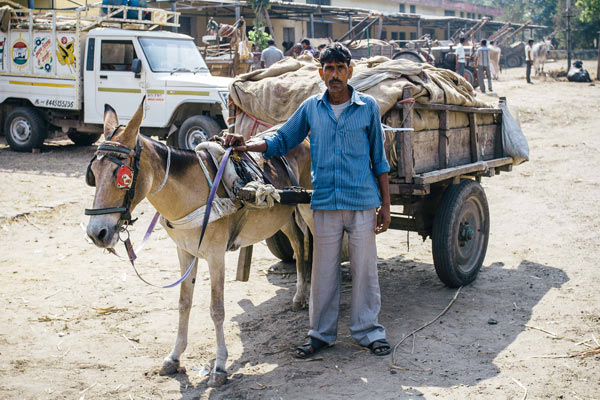Via: horsetalk
An estimated 112 million horses, donkeys and mules support the livelihoods of 600 million people around the globe, an international animal welfare charity says.
The Brooke, which works to improve the lot of working animals in 11 countries, says the contribution of working horses, donkeys and mules to the livelihoods of some of the world’s poorest people is overlooked, leaving working equines invisible in livestock policies and suffering as a result.
Its latest report, Invisible Workers, released today, presents evidence showing how working horses, donkeys and mules enable their owners to earn money, and feed, clothe and educate their families.
These animals work in many areas including construction, agriculture and public transport. Many of them work every day, with inadequate access to food or water, and suffering from wounds, disease and lameness.
Livestock policy and international development programmes exist to make sure that owners can properly care for the animals that contribute to their livelihoods. However, currently the animals included in these policies and programmes are limited to the ones that directly produce food or raw material for fabrics, such as cows, chickens and goats.
Despite the massive contribution working equines make, they are not considered “critical” livestock. The Brooke wants this to change.
“In the developed world, it’s easy to forget that horses once provided a great deal of labour to every-day people,” the charity’s chief executive, Petra Ingram, said.
“For 600 million people around the world today that is still the reality – 112 million horses, donkeys and mules in the world are supporting their livelihoods.
“If people lose those animals because they don’t have access to welfare resources like vaccinations and health programmes, the impact can be devastating.
“Working animals are the invisible powerhouses of the developing world. We want all policy makers to properly recognise the important role they play in supporting the lives of their owners.”
Kawar Pal, 35, is typical of the millions of people around the world who rely on working animals.
He lives close to and trades in Baghpat market, in western Uttar Pradesh, India, earning around 300-400 INR (£3-£4) to support his wife and three children.
Kawar has one mule, a mare aged 15. Two months ago his mule fell whilst at home, striking a wooden stake used to tie her up. This caused internal injuries – a haematoma.
Kawar’s mule was given an operation by a Brooke vet, and had to rest from work for two weeks.
Kawar was extremely grateful for what the Brooke did, but said that it was a hard time for those two weeks, because he couldn’t earn the money he needed to support his family.
“My mule earns the money I use to provide the food for my family and it also gets my children to school. I had to borrow money when she was sick, so I don’t know what I’d do without her. The Brooke has given me back my livelihood.”
Brooke community motivators are doing work in villages to avoid accidents like this. On advice from them, many villages now use half-buried old tyres to secure ropes, instead of the dangerous wooden stakes.
The Brooke will today hold an event to bring together influential partners including the World Organisation for Animal Health and the Food and Agriculture Organisation of the United Nations, to discuss the next steps to getting these animals recognised on the world food security agenda.
END


